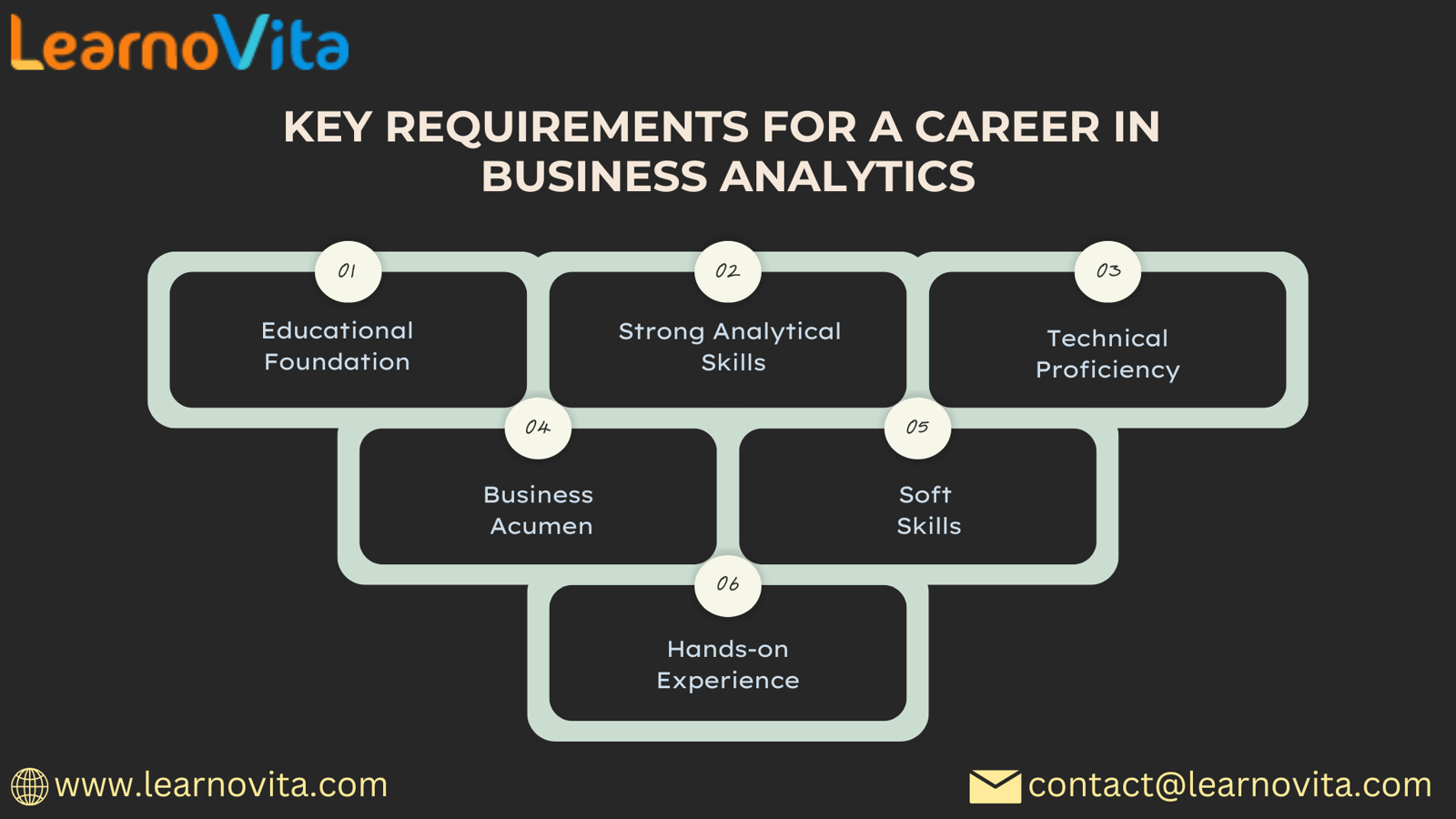Foundational Qualifications for Business Analytics
In the realm of data-driven decision-making, business analytics has become a cornerstone for organizations aiming to harness the power of data. If you’re looking to build a career in this field, understanding the foundational qualifications required is essential. Here’s a comprehensive look at the qualifications you should consider as you embark on your journey in business analytics.
If you want to excel in this career path, then it is recommended that you upgrade your skills and knowledge regularly with the latest Business Analytics Online Course.

1. Educational Background
a. Bachelor’s Degree
A bachelor’s degree is typically the minimum requirement for most business analytics positions. Relevant fields of study include:
- Business Administration
- Data Science
- Statistics
- Computer Science
- Mathematics
While these areas are preferred, diverse academic backgrounds can also lead to success in business analytics, provided you develop the necessary analytical skills.
b. Advanced Degrees
While not always required, obtaining a master’s degree in business analytics or a related field (like data science or an MBA with an analytics focus) can enhance your expertise and improve your job prospects. Advanced degrees often delve deeper into analytical techniques and business strategies.
2. Analytical Skills
A strong foundation in mathematics and statistics is critical for analyzing data effectively. Key skills to focus on include:
- Descriptive Statistics: Understanding data summarization techniques, such as mean, median, and mode.
- Inferential Statistics: Familiarity with hypothesis testing, regression analysis, and drawing conclusions from data samples.
- Probability: Knowledge of probability concepts and their applications in business scenarios.
3. Technical Proficiency
a. Data Analysis Tools
Being proficient in various data analysis tools is essential. Key tools to become familiar with include:
- Excel: A powerful tool for data manipulation and basic analysis.
- SQL: Crucial for managing and querying databases.
- Statistical Software: Tools like R or Python for advanced data analysis and visualization.
- Business Intelligence Tools: Software such as Tableau or Power BI for generating reports and visualizations.
b. Programming Skills
Basic programming knowledge, particularly in languages like Python or R, is increasingly vital. Understanding how to manipulate data programmatically allows for more advanced analytics and automating repetitive tasks.

With the aid of Best Software Training Institute programs, which offer comprehensive training and job placement support to anyone looking to develop their talents, it’s easier to learn this tool and advance your career.
4. Business Acumen
A good business analyst needs to understand the broader business context in which they operate. Key areas to explore include:
- Business Operations: Insight into how different departments function and how data impacts their decision-making processes.
- Market Trends: Awareness of industry trends and their implications for business strategies and performance.
5. Soft Skills
In addition to technical skills, soft skills are essential for success in business analytics:
- Communication: The ability to present complex data insights clearly and effectively to stakeholders.
- Critical Thinking: Evaluating data from various angles to draw meaningful conclusions and recommendations.
- Problem-Solving: Using data to tackle business challenges and develop strategic solutions.
6. Practical Experience
a. Internships and Projects
Hands-on experience is invaluable in business analytics. Look for internships or real-world projects that allow you to apply your skills in a practical setting. Engaging in data analysis projects or case studies can provide practical insights and enhance your resume.
b. Networking
Building relationships with industry professionals through networking events, workshops, and online forums can lead to mentorship opportunities and valuable insights into the field. Networking can also open doors to job opportunities and collaborations.
Conclusion
Embarking on a career in business analytics requires a blend of education, analytical skills, technical expertise, business knowledge, and interpersonal abilities. By focusing on these foundational qualifications, you can position yourself for success in an increasingly competitive landscape. Stay curious, embrace learning opportunities, and prepare to make a significant impact in the world of business analytics!
- Art
- Causes
- Crafts
- Dance
- Drinks
- Film
- Fitness
- Food
- الألعاب
- Gardening
- Health
- الرئيسية
- Literature
- Music
- Networking
- أخرى
- Party
- Religion
- Shopping
- Sports
- Theater
- Wellness



